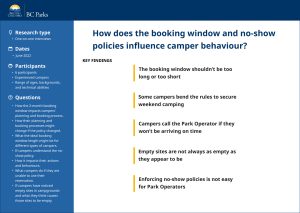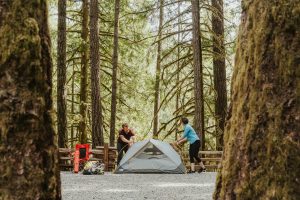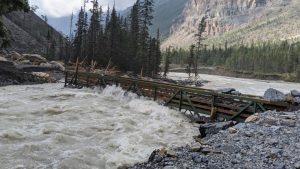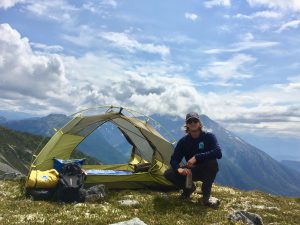A Year of Design Research at BC Parks
Categories:
A year ago, BC Parks set out on a path to transform into a user-centered, design-driven organization when it comes to its recreation services.
Our shared goal is to ensure our services are:
Simple, streamlined, and human-centred, with improvements based on a continuing practice of real-world user experience research.
We’ve jumped a few hurdles and hit some walls along the way, but overall, we’ve made great progress towards that goal.
In the past year, we’ve:
- Established a research and design team at BC Parks.
- Conducted ongoing research throughout the year, using a variety of methods and channels.
- Gathered our findings in one place so BC Parks staff have quick access to everything we’ve learned.
- Made improvements (big and small) to products and services based on the feedback we’ve received.
As the next step in our growth as a user-centered organization, we’re making our research findings available to the public on this blog.
But before we get to that, you may be wondering…
What is design research?
At its simplest, design research is about listening to the people who use what we create (e.g., services, websites, apps, or even physical products).
We ask questions, we observe people using our products, and we hear what they have to say. Then we use that feedback to make our products better.
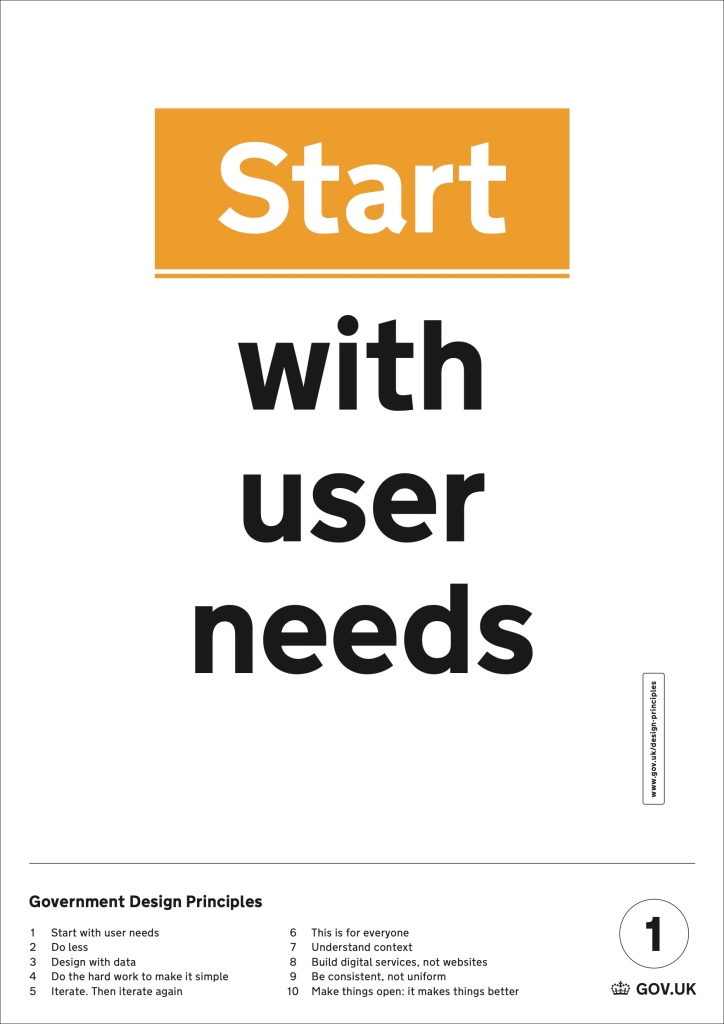
Why do we do design research?
Listening to people before, during, and after we create a service or product makes us better able to meet their needs and expectations.
Imagine if you went to a restaurant and the waiter brought out the food without taking your order. There’s a slim chance that meal would be satisfying, let alone something you love.
Building products and services without talking to users is kind of like bringing out the food without asking what you want.
We need to spend time asking what people want and need. Only then we can be sure that what we serve up will hit the spot. And then, after the “meal” is served, we come back and ask how it was and what we can do to improve it for next time.
This process of continual research and improvement helps us continue to meet people’s needs over the long term.
Interested in learning more about user-centered design in the government context? You’ll find it at #2 in the Province’s Digital Principles, included in a broader set of guidance and case studies regarding service and content design in the BC Government. In addition, this article from members of the UK’s Government Digital Service, leaders in this space, is a great resource for a deeper dive.
How can you take part in our research?
Start by participating in one of our surveys
Camping reservations survey
Have you made a camping reservation for the 2022 season? If so, we’re eager to hear what you think of the new site. Take the survey.
BC Parks beta website survey
- Visit the beta site first.
A “beta” is a service – in this case a content service, aka information website, that has been released to the public, in limited form, for the purpose of testing usability, gathering feedback, finding mistakes and fixing them before wide release. Here, we’re working towards replacing the “legacy” version of bcparks.ca in its entirety, later this year. - Click the Feedback Form link at the top of the site (in the bright yellow strip) to share your thoughts.
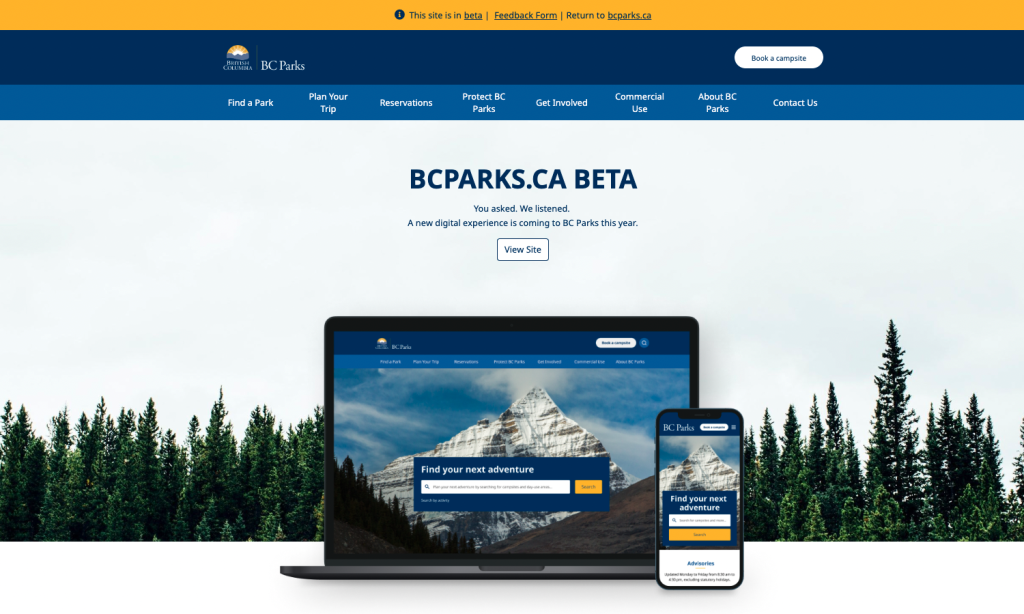
Volunteer for one-on-one research sessions
We are always looking for people who would like to take part in our design research activities. If you’re interested in one-on-one research, you can sign up using this form.
We contact people from our (very long! we’re chuffed, thank you!) volunteer list at random, so we can’t promise that we’ll be able to talk to you for this type of research.
What research have we done so far?
In the past year, we’ve listened to feedback from hundreds of people in various ways, including:
- One-on-one conversations with park visitors (known as research interviews).
- Observing as people use the software we are building (known as usability testing).
- Observing as people navigate the menus on bcparks.ca (known as task testing).
- Public surveys.
- Monitoring social media and customer service emails for feedback.
The list below shows the research activities we’ve done in the past year. In our next blog posts, we’ll share details about what we have learned and what changes we have made in response.
May 2021 – BC Parks website task testing
- Understand what information people are looking for and where they would look for it on bcparks.ca.
- Test a draft site navigation to discover what could be improved.
July 2021 – BC Parks website research interviews
- Understand what content is important for people when planning a camping trip or visit to parks.
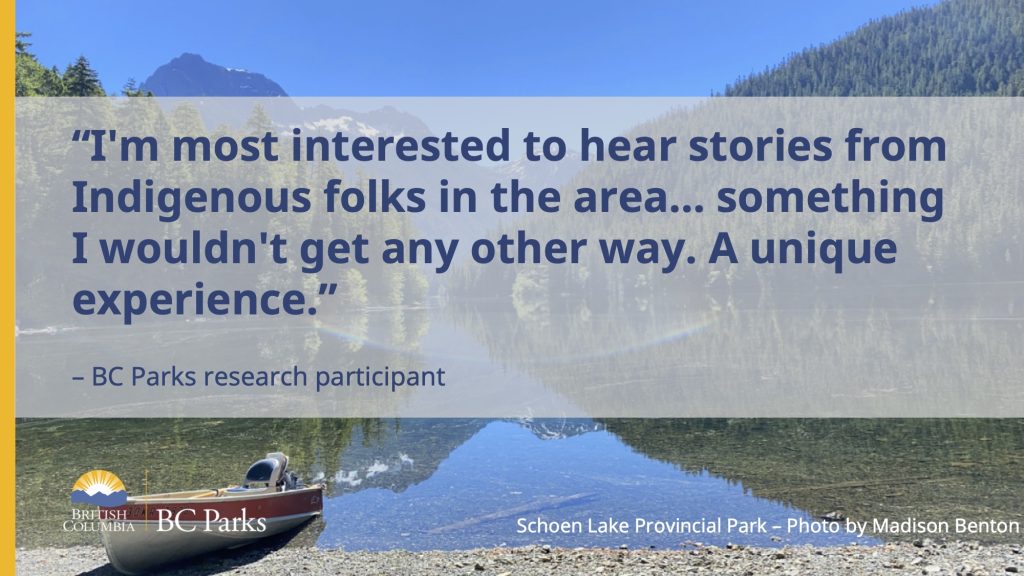
September 2021 – Camping service research interviews
- Understand how campers currently experience the digital aspects of the camping service.
- Explore what a future, ideal camping experience might look like.
November 2021 – Camping reservations prototype usability testing
- Identify problems people might have when using the prototype of the camping reservation process.
- Determine how well people understand the policies underlying the booking process.
January 2022 – Day Use Pass usability testing
- Identify problems people have experienced when using the booking process for the Day Use Pass service.
February 2022 – BC Parks beta website usability testing
- Identify areas for improvement in the park search and filter tools.
- Discover if people can easily find relevant content on the site.
- Learn what types of activities visitors would take part in at provincial parks in B.C.
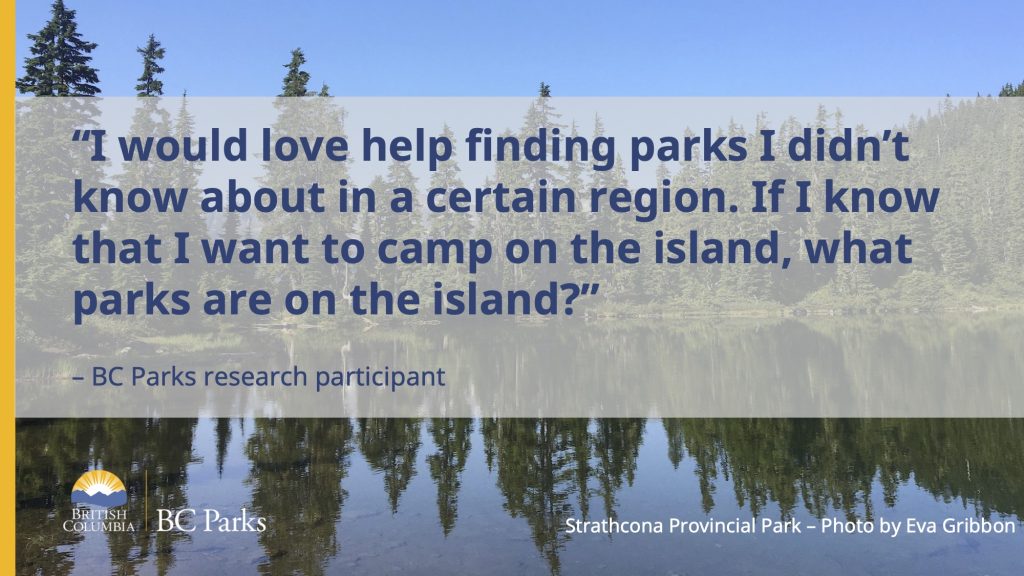
February 2022 – BC Parks beta website public survey
- Measure overall satisfaction with the new site design.
- Discover if people can easily find relevant content on the site.
- Identify any parts of the site that are confusing or difficult to use.
March 2022 – BC Parks beta website usability testing
- Discover the ways people use maps to plan their park visits and camping trips.
- Learn what features an ideal future map would have.
- Understand if people can find camping policy information on the site.
- Learn how and when people look at various camping policies.
March 2022 – Camping reservation system public survey
- Measure overall satisfaction with the new camping reservation system.
- Learn if people can successfully book a campsite using the new camping reservation system.
- Identify any areas of the camping reservation system that are difficult for people to use.

April and May 2022 – Camping reservation system public survey
- Identify any steps in the reservation process that are difficult or confusing for campers.
- Learn if the policy information provided on the camping reservation site is clear and useful.
- Identify any steps in the change and cancellation process that are difficult or confusing for campers.
What’s next?
We plan to continue our current research efforts while exploring new methods of learning from members of the public.
We’ll use this blog to share regular updates about:
- What we have learned so far from our research; and
- How these insights have changed our services and products.
Keep your eyes on this blog or our social media channels for our next update.

